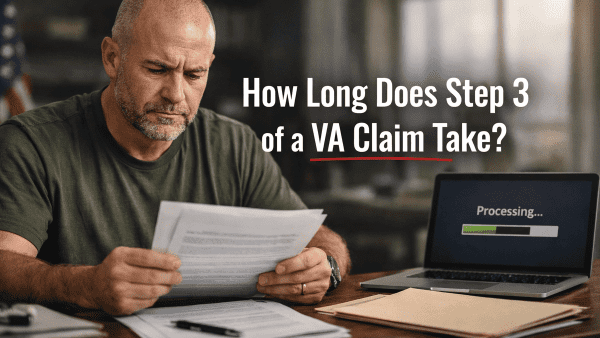Looking for Expert-Level VA Claim Answers?📱Call Us Now! 737-295-2226
Is 100% VA disability with multiple sclerosis (MS) possible? Absolutely!
If you’re living with MS, you know the toll it takes on your body and the challenges everyday tasks become.
However, if you can prove your military service directly caused your MS, VA benefits may be around the corner, including the golden ticket of 100% VA disability.
Don’t know where to start? This post will help you understand how to service-connect MS, what VA disability rating you should expect, and much more. Let’s begin!
Summary of Key Points
-
The minimum VA rating for Multiple Sclerosis is 30%.
-
VA ratings for MS primarily depend on your residual symptoms like speech problems, vertigo, or paralysis.
-
Multiple sclerosis is rated under § 4.124a Schedule of ratings—neurological conditions and convulsive disorders, diagnostic code 8018.
-
MS is considered presumptive if your symptoms or diagnosis occurred during military service or within seven years after honorable discharge.
Table of Contents
MS and Military Service

MS causes the immune system to attack the protective sheath covering nerve fibers, which leads to communication problems between the brain and the rest of the body.
The VA estimates that between 55,000-70,000 veterans live with MS, affecting roughly 1% of the veteran population.
MS is tricky because it can show its face at any age and without warning. It’s frequently unpredictable, and symptoms creep in years before an official diagnosis.
100% VA Disability with Multiple Sclerosis
You may be eligible for 100% VA disability with multiple sclerosis if:
- You qualify for total disability based on individual employability
- You have multiple disabilities with a combined VA rating of 100%
- Your MS diagnosis qualifies you for total and permanent disability

Deserve a Higher VA Rating?
Book a no-obligation VA Claim Discovery Call with an experienced team member. We’ll review your situation, spot what the VA may have missed, and help you map out a strategy to unlock the VA disability rating and tax-free compensation you’ve earned for your service. Click the red button below to book your call.
MS VA Disability Ratings
The VA rates MS under § 4.124a Schedule of ratings—neurological conditions and convulsive disorders, diagnostic code 8018.
The minimum MS VA disability rating is 30%, with many veterans receiving a higher rating.
Because MS can vary so differently in symptoms and severity, every veteran will be rated individually, meaning there is no definite table of ratings for veterans with MS after the minimum floor of 30%.
Generally, your multiple sclerosis VA rating will depend mainly on your residual symptoms.
Note: It is required for the minimum ratings for residuals under diagnostic codes 8000-8025, that there be ascertainable residuals. Determinations as to the presence of residuals not capable of objective verification, i.e., headaches, dizziness, fatigability, must be approached based on the diagnosis recorded; subjective residuals will be accepted when consistent with the disease and not more likely attributable to other disease or no disease.
It is of exceptional importance that when ratings more than the prescribed minimum ratings are assigned, the diagnostic codes utilized as bases of evaluation be cited, in addition to the codes identifying the diagnoses.
Examples of MS residuals include:
- Speech problems
- Sleep disturbances
- Mental health disorders
- Vertigo
- Vision problems
- Paralysis
- Incontinence
- Erectile dysfunction
Average VA Disability Rating for Multiple Sclerosis

There is no accurate average VA disability rating for multiple sclerosis since it varies significantly from one person to the next.
Once you prove your condition is connected to your military service, you can expect at least a 30% VA rating for MS.
MS as a Presumptive Condition
MS is considered to be a VA presumptive condition, meaning it could be presumed your disability was caused by military service when symptoms or a diagnosis of MS occur during military service or within seven years after an honorable discharge.
Keep in mind that you may still qualify for an MS VA rating after seven years following your discharge, but you will need to service-connect your disability to your military service. That is, it wouldn’t be considered a presumptive condition at that time.
Agent Orange and Multiple Sclerosis
There is currently no evidence showing a link between Agent Orange and multiple sclerosis.
Service Connection
Service connecting your Multiple Sclerosis VA disability is vital because it proves your condition is directly caused or aggravated by your military service.
To prove service connection for multiple sclerosis, you must provide the following:
- A current medical diagnosis of MS
- Evidence of an in-service event, injury, or illness
- A medical nexus (or link) between your current diagnosis of MS and the in-service event, injury, or illness (can be a Nexus Letter)
Note: If your condition is presumptive, you don’t need to supply a nexus letter.
When to File a VA Claim
You must have an official medical diagnosis before you file a VA claim for multiple sclerosis,
You also want to keep in mind that multiple sclerosis can be challenging to diagnose, especially at first when symptoms may be mild.
This means you must gather as much evidence as possible while compiling a very persuasive argument.
It also means knowing your records, your history with the condition, and its symptoms in detail and then gathering buddy letters from friends, family, and fellow service members to substantiate your claim.
4 Ways to File a VA Claim for Multiple Sclerosis
If you’re ready to file your VA claim for multiple sclerosis VA disability, look below and find the best method for you.
- File a VA claim online using VA form 21-526EZ. (Usually the fastest method)
- Mail your application to:
Department of Veterans Affairs
Claims Intake Center
PO Box 4444
Janesville, WI 53547-4444
- Drop your application off at a local VA regional office.
- Fax your application to:
844-531-7818 (Within the US)
248-524-4260 (Outside the US)
VA Benefits for Veterans with MS
The VA has various medical and support services for veterans diagnosed with multiple sclerosis, including, but not limited to:
- Skilled Home Health Care
- Respite Care
- Medical Foster Homes
- Clothing Allowance
- Home Improvements and Structural Alterations
- Aid and Attendance or Household Benefits
- Caregiver Support Services
Note: Some VA benefits are based on your level or VA disability percentage, while others may be based on service connection.
Special Monthly Compensation (SMC)
In addition to disability compensation, veterans with MS who are service-connected may be entitled to receive a Special Monthly Compensation (SMC). This can be for assistance in daily living or for those who are permanently housebound.
Secondary Conditions to MS
The many different ways MS can affect a veteran also means that there are several opportunities to receive a rating for a secondary condition as your symptoms develop. For example, depression is a major side effect of MS, and veterans can file to receive VA benefits for depression on top of their MS benefits.
Denied VA Claim for Multiple Sclerosis?
No one wants to receive a denied VA claim, but you have options. If you disagree with the VA’s decision on your claim, you can choose from one of the following decision review options. (For decisions dated on or after February 19, 2019)
If you don’t agree with the decision of your first option, you can try a different eligible option. For example, if you receive a denied higher-level review, you can appeal to the Board of Veterans’ Appeals.
However, if your higher-level review is denied, you can’t request a new one. In addition, if you disagree with a VA medical decision, you can request a Clinical Appeal.
Did You Know? You can receive benefits from the VA whether or not you are service-connected. The VA provides healthcare services for veterans with MS throughout their life.
NEED MORE ASSISTANCE?
Most veterans are underrated for their disabilities and, therefore, not getting their due compensation.
At VA Claims Insider, we help you understand and take control of the claims process so you can get the rating and compensation you’re owed by law.
Our process takes the guesswork out of filing a VA disability claim and supports you every step of the way in building a fully-developed claim (FDC).
If you’ve filed your VA disability claim and have been denied or have received a low rating—or you’re unsure how to get started—reach out to us! Take advantage of a VA Claim Discovery Call.
Learn what you’ve been missing—so you can FINALLY get the disability rating and compensation YOU DESERVE!
Author

Kelly Olone
Kelly Olone is a military spouse who earned her degree in Psychology from Florida International University. After working in the non-profit sector for several years, she turned to her passion for writing. She aims to contribute to a better understanding of the valuable benefits that veterans deserve. As a mom, Kelly navigates the delicate balance between deadlines and bedtime stories with finesse.



